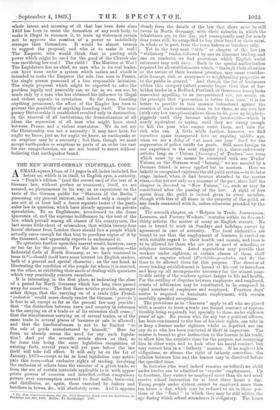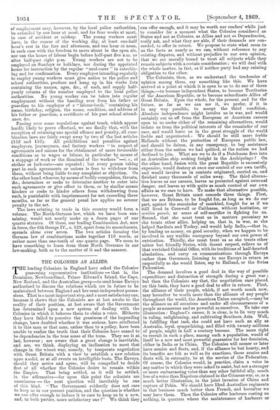THE NEW NORTH-GERMAN INDUSTRIAL CODE.
ASMALL square 16mo, of 54 pages in all, index included, lies before us, which is in itself, to English eyes, a curiosity, —a "People's edition" (and the second one) of the text of a German law, without preface or comment ; itself, we are assured, no phenomenon in its way, as an experiment on the taste of the German public for "Statutes of the Realm" possessing any general 'interest, and indeed only a sample of one out of at least half a dozen separate issues of the parti- cular law in question, which have already appeared on private speculation. To an Englishman, accustomed to the dense ignorance of, and the supreme indifference to, the text of the law, which prevail among all classes of his countrymen, the fact seems little short of miraculous, that within twenty-four hours' distance from London there should live a people which actually cares enough for that text to purchase copies of it by the thousand, and apparently expects to understand it.
To spetulate further upon this marvel would, however, carry ais too far for the present. For the law in question,—the Industrial Code of North Germany, as we have ventured to term it,*—should itself have some interest for English readers, both of a general and special character ; on the one hand, as illustrating the condition of the people for whom it is enacted, on the other, as exhibiting their mode of dealing with questions -which very practically concern ourselves.
It is interesting, in the first place, as indicating the close of a period for North Germany which has long since passed away for ourselves. The first three articles provide, amongst other things, that the carrying on of a trade (the French industrie' would more closely render the German getverbe') is free to all, except so far as the present law may provide ; that "the distinction between town and country in reference to the carrying on of a trade or of its extension shall cease 'that the simultaneous carrying on of several trades, or of the same trade in several places of business or sale is allowed ; and that the handicraftsman is not to be limited "to the sale of goods manufactured by himself." How far from us already seems the need for any such legisla- tion I And yet the seventh article shows us that, so • far from this being the mere legislative recognition of -existing facts, several years will yet pass before the law itself will take full effect. It will only be on the 1st of' January, 1873—except so far as local legislation may antici- pate this term—that exclusive rights of trading, involving the exclusion of others from the exercise of a given trade, or from the use of certain materials applicable to it, with appro- priate powers of coercion and interdict,—that compulsory powers over consumption annexed to flour mills, breweries, and distilleries, or, again, those exercised by bakers and butchers in towns, &c., will absolutely cease. And it appears
* Die Nene Gewerbe-Ordnung fur den Nord-Deuischen fiend, each den Beach! iissen des Reichstags vom Alai, 1869. Berlin; Fr. Kortkampf. 1869.
clearly from the details of the law that there must be still towns in North Germany, with their suburbs, in which the inhabitants are, to this day, and consequently may for nearly four years still, be compelled to buy their bread or their meat, in whole or in part, from the town bakers or butchers only.
Yet in the very next " title " or chapter of the law (on " stationary " trades, followed by one on itinerant trading, and one on markets) we find provisions which English social reformers may well envy. Such is the special authorization required for all establishments which, "through their situation or the nature of their business premises, may cause consider- able damage, risk, or annoyance to neighbouring properties or to the public in general." And though the list of businesses within this category (albeit scarcely larger than that of for- bidden trades in a Bedford, Portland, or Grosvenor lease) looks somewhat appalling to an inexperienced eye, yet surely, on the principle that prevention is better than care,- it is far better to provide in this manner beforehand against the creation of trade nuisances, than to let them, as our own law (with very few exceptions) allows them to do, grow up higgledy- piggledy until they become wholly intolerable—which is nearly equivalent to saying, until they are strong enough to kill the poor who cannot resist them, and ruin the rich who can. A little while further, however, we find ourselves again transported into an expiring middle age, when we see a delay of "at most one year" fixed for the suppression of police tariffs for goods. Still more foreign to our experience is the next chapter (vi.), three-and-twenty articles long, on "Unions [Innungen] of Traders,"—a term which must by no means be connected with our Trades' Unions, as the German word "Innung," we are assured by a German friend, is never applied but to masters. Here we behold in recognized existence the old guild system,—in its later stage, indeed, when it had become absorbed in the master class,—but yet not only as a remnant of the past, since half the chapter is devoted to "New Unions," i.e., such as may be constituted after the passing of the law. A right of free egress from the guild is indeed given to every member, though with loss of all share in the property of the guild, or any funds connected with it, unless otherwise provided by the rules.
The seventh chapter, on "Helpers in Trade, Journeymen, Learners, and Factory Workers," contains within its five-and- thirty articles the matter of many an English statute. No one is bound to work on Sundays and holidays, except by agreement in case of necessity. The local authorities are bound to see that the employment of learners is carried on with suitable regard to their health and morals, and time is to be allowed for those who are yet in need of schooling or religious instruction. Local regulations may provide that workers under eighteen, or certain classes of them, shall attend a superior school (Fortbildungs-schule), and fix the time to be allowed them for this purpose. The director of every trading establishment is bound at his cost to introduce and keep up all arrangements necessary for the utmost prac- ticable safety of the workers against danger to life and health. For the settling of disputes between employers and employed, courts of arbitration may be constituted, to be composed in equal numbers of employers and employed. Fourteen days' notice is required to terminate employment, with certain carefully specified exceptions.
The provisions as to "learners" apply to all who are placed with a master to learn a trade (no formal contract of appren- ticeship being required), but specially to those under eighteen years' of age. No person who, for any but a political offence, has been condemned to the loss of his civic rights, can take in or keep a learner under eighteen whilst so deprived, nor can any do so who has been convicted of theft or imposture. The master is bound to give instruction to the learner in his trade, to allow him the requisite time for the purpose, not occupying him in other ways, and to look after his moral conduct, but may correct him in a " fatherly " manner. If he neglects his obligations, or abuses the right of fatherly correction, the relation between him and the learner may be dissolved before the specified time. In factories (the word indeed remains undefined) no child under twelve can be admitted to "regular" employment. Up to fourteen, they cannot be employed more than six and must receive school instruction for at least three hours a day. Young people under sixteen cannot be employed more than ten hours a day, which may be reduced to six in those por- tions of the "Bund " in which they may be still within the age daring which school attendance is obligatory. The hours of employment may, however, by the local police authorities, be extended by one hour at most, and for four weeks at most, in case of accident or mishap. The young workers must have, in the course of the working day, at least one-half hour's rest in the fore and afternoon, and one hour at noon,. in each case with the freedom to move about in the open air, nor can the hours of labour begin before half-past five am. or after half-past eight p.m. Young workers are not to be employed on Sundays or holidays, nor during the appointed hours for instruction by the regular " soul-carer " in catechiz- ing and for confirmation. Every employer intending regularly to employ young workers must give notice to the police and school authorities, produce and hang up in his works lists containing the names, ages, &c., of each, and supply half- yearly returns of the number employed to the local police authorities. No young worker can be taken into regular employment without the handing over from his father or guardian to his employer of a "labour-book," containing his name, birthday, religion, the name, condition, and address of his father or guardian, a certificate of his peat school attend- ance, kc.
Passing over some regulations against truck, which appear hardly likely to prove effectual, we see finally that, with the exception of retaining one special offence and penalty, all com- bination laws are fairly swept away by two of the last articles
(152 and 153). All prohibitions and penalties against employers, journeymen, and factory workers "in respect of agreements and unions for the obtainment of more favourable conditions as to wages or labour, in particular by means of a stoppage of work or the dismissal of the workers "—i. e., of strikes or lock-outs—are repealed ; but every person taking part in such agreements or unions is free to withdraw from them, without being liable to any complaint or objection. On the other hand, whoever, by means of bodily compulsion, threats, &c., determines or seeks to determine another to enter into such agreements or give effect to them, or by similar means hinders or seeks to hinder others from withdrawing from such, is punishable with imprisonment for not exceeding three months, so far as the general penal law applies no severer penalty to the act.
The laws relating to trade in this country would form a volume. The North-German law, which we have been exa- mining, would not nearly make up a dozen pages of our quarto statutes. Of these, our leading Combination Act, now in force, the 6th George IV., c. 129, apart from its amendments, spreads alone over seven. The two articles forming the German law of combinations make together 116 words, or rather more than one-tenth of one quarto page. We seem to have something to learn from these North Germans in our law-making, both as to the matter of it and the manner.































 Previous page
Previous page